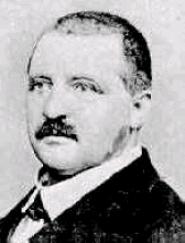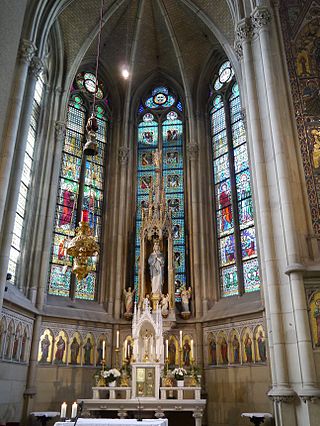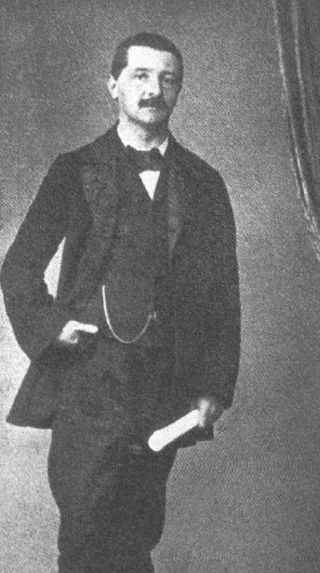Related Research Articles

The Mass No. 3 in F minor, WAB 28, is a setting of the mass ordinary for vocal soloists, chorus and orchestra, and organ ad libitum, that Anton Bruckner composed in 1867–1868.

The Mass No. 2 in E minor, WAB 27 is a setting of the mass ordinary for eight-part mixed choir and fifteen wind instruments, that Anton Bruckner composed in 1866.

The Requiem in D minor, WAB 39, is a Missa pro defunctis composed by Anton Bruckner in 1849.

The Missa solemnis, WAB 29, is a solemn mass composed by Anton Bruckner in 1854 for the installation of Friedrich Mayer as abbot of St. Florian Monastery on 14 September 1854.

Bruckner's Psalm 112, WAB 35, is a psalm setting for eight-part double mixed choir and full orchestra. It is a setting of a German version of Psalm 113, which is Psalm 112 in the Vulgata.

The Mass No. 1 in D minor, WAB 26 by Anton Bruckner, is a setting of the Mass ordinary for soloists, mixed choir and orchestra, and organ.

The Windhaager Messe, WAB 25, is a missa brevis composed by Anton Bruckner in 1842.

The Kronstorfer Messe, WAB 146, is a missa brevis composed by Anton Bruckner in 1843-1844.

The Messe für den Gründonnerstag, WAB 9, is a missa brevis composed by Anton Bruckner in 1844.

Christus factus est, WAB 11, is a sacred motet by Anton Bruckner, his third setting of the Latin gradual Christus factus est, composed in 1884. Before, Bruckner composed in 1844 a first piece on the same text as gradual of the Messe für den Gründonnerstag, and in 1873 a motet for eight-part mixed choir, three trombones, and string instruments ad libitum. The motet is an expressive setting of the gradual, influenced by Wagner's music.

Christus factus est, WAB 10, is a sacred motet by Anton Bruckner, his second setting of the Latin gradual Christus factus est, written in 1873. Several decades earlier, in 1844, he had composed another piece on the same text as gradual for the Messe für den Gründonnerstag. In 1884, Bruckner composed a third, better known setting for choir a cappella.

Os justi, WAB 30, is a sacred motet composed by Anton Bruckner in 1879. Os Justi is a Gregorian chant used as gradual of the Commune Doctorum, and as introit I and gradual II of the Commune Confessoris non Pontificis.

Asperges me, WAB 4, is a sacred motet composed by Anton Bruckner. It is a setting of the Latin Asperges me, the antiphon used for the celebration of Asperges.

Libera me, WAB 21, is the first of two settings of the absoute Libera me, composed by Anton Bruckner in c. 1843.

The Mayer Cantata, WAB 60, is a cantata composed by Anton Bruckner in 1855. It is the second of three larger-scale occasional compositions, and the composer's first extended composition for large wind ensemble and choir.

The Festgesang, WAB 15, is a cantata composed by Anton Bruckner in 1855.

Vergißmeinnicht (Forget-me-not), WAB 93, is a cantata composed by Anton Bruckner in 1845.
References
- Sources
- ↑ Österreichisches Musiklexicon online: Landmesse
- ↑ J. Williamson, p. 43
- ↑ Messe in C‑Dur (WAB 25, „Windhaager Messe“)
- ↑ Messe ohne Gloria in d‑Moll (WAB 146, „Kronstorfer Messe“)
- ↑ Messe für den Gründonnerstag in F‑Dur (Christus factus est I, WAB 9)
- ↑ Kyrie und Gloria (WAB 227) )
- ↑ U. Harten, p. 245
- ↑ C. Van Zwol, p. 700
- ↑ Missa pro Quadragesima in g‑Moll (WAB 140)
- ↑ R. Haas, p. 42
- 1 2 3 4 C. van Zwol, p. 710
- ↑ U. Harten, p. 288
- ↑ Gesamtausgabe - Kleine Kirchenmusikwerke
- ↑ Kyrie und Gloria (WAB 227) )
- 1 2 3 U. Harten, p. 350
- ↑ Messe in Es‑Dur (WAB 139)
- ↑ U. Harten, pp. 287-288
- ↑ A Chance to Hear Bruckner's Kyrie in Es-Dur
- ↑ P. Hawkshaw
- ↑ Requiem in d‑Moll (WAB 141)
- Further reading
- Robert Haas, Anton Bruckner, 2nd print (Reprint der Ausgabe Athenaion, Potsdam, 1934), Laaber Verlag, Regensburg, 1980. ISBN 3-9215-1841-5
- Uwe Harten, Anton Bruckner. Ein Handbuch. Residenz Verlag , Salzburg, 1996. ISBN 3-7017-1030-9.
- John Williamson, The Cambridge Companion to Bruckner , Cambridge University Press, Cambridge, 2004. ISBN 0-521-80404-3
- Cornelis van Zwol, Anton Bruckner 1824-1896 - Leven en werken, uitg. Thoth, Bussum, Netherlands, 2012. ISBN 978-90-6868-590-9
- Paul Hawkshaw, Anton Bruckner and the Austrian Choral Tradition in: Donna M. Di Grazia, Nineteenth-Century Choral Music, Routledge, 2013. ISBN 978-1-136-29409-9
- Anton Bruckner - Sämtliche Werke, Band XIV: Requiem in D minor, edited by Leopold Nowak and Rüdiger Bornhöft, 1998
- Anton Bruckner - Sämtliche Werke, Band XV: Missa solemnis in B-flat, edited by Leopold Nowak, Vienna, 1975
- Anton Bruckner - Sämtliche Werke, Band XVI: Mass No. 1 in D minor, edited by Leopold Nowak, Vienna, 1957
- Anton Bruckner - Sämtliche Werke, Band XVII: Mass No. 2 in E minor (1866/1882), edited by Leopold Nowak, Vienna, 1959/1977
- Anton Bruckner - Sämtliche Werke, Band XVIII: Mass No. 3 in F minor (1883/1893), édited by Leopold Nowak, Vienne, 1960 / new edition by Paul Hawkshaw, Vienna, 2005
- Anton Bruckner - Sämtliche Werke, Band XXI: Kleine Kirchenmusikwerke, edited by Hans Bauernfeind and Leopold Nowak, Vienna, 1984/2001